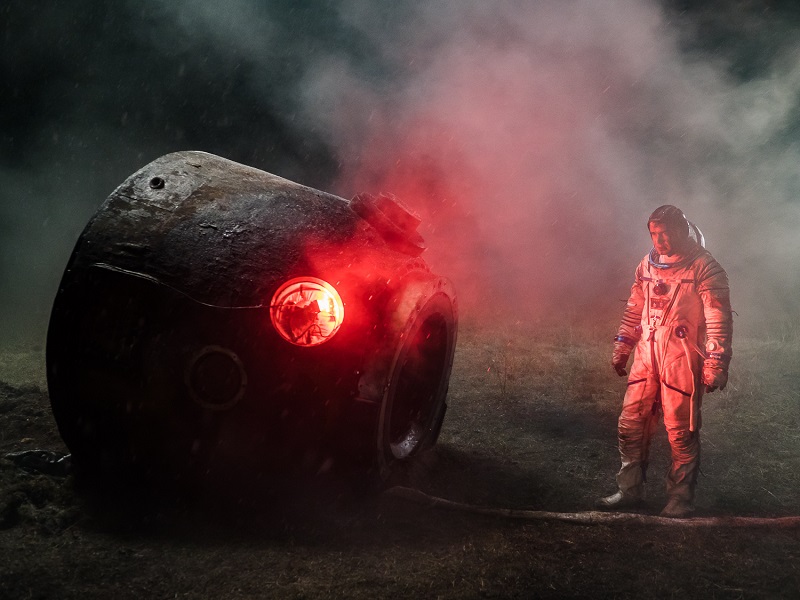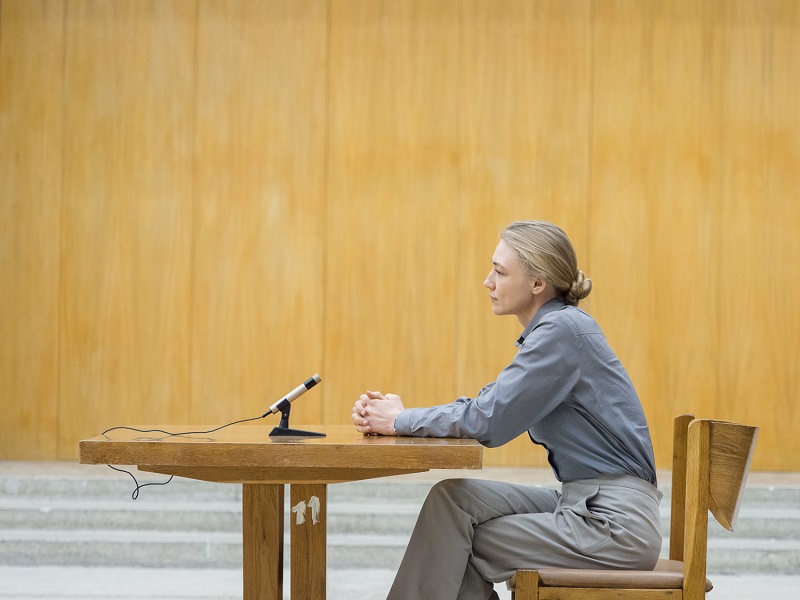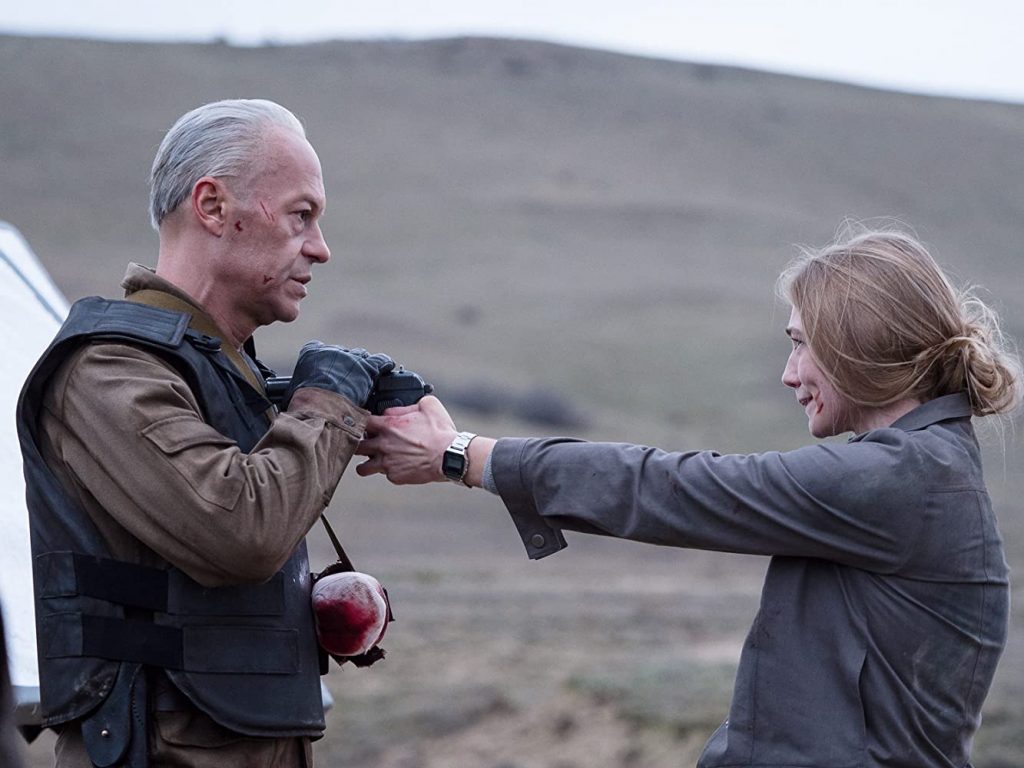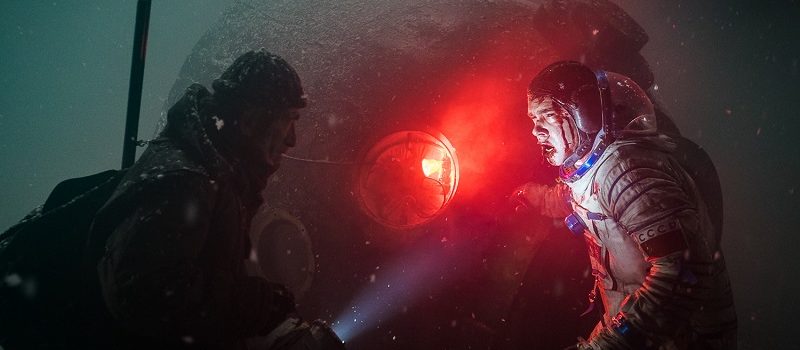Sputnik famously served as the moniker for the Russian satellite whose journey into outer space proved to be a historic first. The USSR had (for only a few months) beaten the Americans in the space race. Given that title, those who get to witness the new horror/thriller/sci-fi flick, from the former Soviet Union, have to firmly be aware that something nefarious is coming. Let’s just say the iconic image that is the splashdown takes on an elevated level of fear.

For every soul that longs to be an astronaut, being shot into space—regardless of how long or short the journey—is the ultimate. For Konstantin Veshnyakov (Pyotr Fyodorov), his time off the planet has made him a hero to a nation hungry for idols. It’s 1983 and the USSR and the USA are in the midst of a frightening Cold War that had been raging since the curtains fell on World War II. In Sputnik, when Veshnyakov and his vessel splashdown in a remote area of what is now Kazakhstan, he is severely injured and needs medical attention ASAP.
When he awakes from his slumber, he’s stunned. His partner in their mission had perished. Soviet authorities want answers. Two souls went into space and only one came home… at least in a human form.
Meanwhile, Oksana Akinshina (Tatyana Klimova), is a psychiatrist who is introduced as she answers to authorities for her unorthodox treatment of a patient. She is exactly who Colonel Semiradov (Fedor Bondarchuk) needs to assess the cosmonaut’s mental and physical state. He currently sits in a remote facility as a Moscow ordered investigation commences. Initially, she is not interested, but the inner scientist inside her cannot resist the curiosity that surrounds this entire affair.
Just one of a litany of questions that she and everyone else working this case wonders is … What exactly happened up there?
What director Egor Abramenko reveals to his audience, as the film commences, is two cosmonauts readying to return home. They sing. They joke, everything is blissful. Then, something surrounds their capsule as the light of Earth is blacked out. The veteran space pilot doesn’t remember a thing. Amazingly, he appears to be unharmed. Time for Dr. Akinshina to get to work.
The screenplay for Sputnik, by Oleg Malovichko and Andrei Zolotarev, weaves its web in a manner that is intricate, scientifically centric, thrilling, and yes, horrific. How this entire incident will one, be explained, and two, get resolved, is the crux of the entire story from the Russian screenwriters. They have crafted a script that is impeccably taut and never wastes a single moment on exposition or backstory. During the opening moments, the story grabs by the lapels and never releases. The bitter end… let’s just say that it doesn’t wrap this thing up with a bow.
Hollywood, if they wanted to remake this startling slice of cinema, would most certainly alter the conclusion so that there were no questions left unanswered. Thankfully, Russian cinema (and global movie-making for that matter) doesn’t work that way. With Sputnik, filmmakers have delivered a gut-punch that is purely a science fiction and horror hybrid. It feels like one of those literary thrillers where you cannot put the book down. Each frame of the film feels like the turning page of a novel. We barrel down the rabbit hole that is an alien attack, yet it is done in such a manner that it simultaneously salutes many classic flicks, that we all know and adore (Arrival, The Invasion of the Body Snatchers and John Carpenter’s The Thing), as it stakes out its own cinematic personality.

Cinematographer Maxim Zhukov frames Abramenko’s artistry with a stunning flair for capturing Russia in the early 80s, all while pushing the envelope in tone. The Soviet Union hardly possessed a colorful palette. Yet there is a distinctive generic landscape—from individual buildings to the outer barren wilds that surrounds the facility. The cinematography is as haunting as the subject matter itself. That’s no easy task, and Zhukov achieves it brilliantly. He also keenly knows how to capture his subjects, the actors, in a manner that further illuminates character traits and sentiment.
There are three major players in this mystery laced with horror—Klimova, Semiradov, and Veshnyakov. Each is stellar and achieves so much emotively and narratively with so little. Much is achieved through facial gestures or physical mannerisms that wholeheartedly enliven these characters.
Akinshina is a find, the camera adores her. She is fiercely independent and as the days go by, one can see why Semiradov tapped her for this endeavor. Even though the USSR was notoriously heavy-handed when it came to how much of its truths were revealed to its populous, the doctor does what she wants in the name of seeking answers to questions posed from the highest reaches of power. The actress and Veshnyakov have chilling chemistry. It is painfully clear why he trusts her, especially when it comes to discussing the creature that emerges from his insides every evening at a specific time, like clockwork. It leaves him practically unconscious on the floor, yet still feeling everything the alien endures. Witnessing patient and doctor do what they must to seek the truth is just one spoke of joy in the wheel that is Sputnik.

If there is an antagonist, beyond the alien that is fed prisoners nightly so that scientists can continue to work its way through the riddle that is its existence, it is the Colonel. He firmly sees this creature as a potential weapon to be used in the Cold War. For Klimova, her motivation firmly lies in the well-being of her patient. We learn that the alien and its host are becoming more and more symbiotic with each passing day. There is no way to keep the cosmonaut alive if they terminate the alien. Those in power do not want that to happen. After all, this space jockey is a national hero. Bondarchuk brings an approachability to his role that emotively pulls the audience into his world and more importantly, his motives.
Between the richness of the three leads and the concurrently intimate and vast scope of the subject matter, it is astonishing how screenwriters were able to pen a story with a bevy of thrills as well as moments that’ll produce physiological responses to the shock and awe coming from your screen. It also is important to salute Sputnik’s storytellers for their ability to navigate the landmines. The subject matter could easily mirror other fictional stories that share its premise. It doesn’t. The film delivers something unique all its own.
Director Abramenko’s background in helming commercials must have prepared him for delivering visual moments that entertain, enlighten, and do so in a minute amount of time. His command of the pacing of Sputnik is sublime. This is one of those movies where that look to the watch for the time… never arrives. The director possesses a storytelling aptitude that equally reveals riveting plot twists and turns… all while it wraps itself around your heart. We care about all involved. Too often in the horror, science fiction or thriller milieus, filmmakers take too long to get to the point.

Two other arenas must be saluted before this review wraps up. The score by Oleg Karpachev is piercingly raw and too does much with little. Every filmmaker aspires to have the sonic succulence of its musical score add layers to its emotive breadth. With Sputnik, Karpachev plants a tonal flag that breathes tension when called for, and levity when warranted. The other below-the-line department that warrants a spotlight is the creature creators. Audiences have seen countless aliens and monsters over cinema’s 100 years, and it is extremely difficult to achieve something original when it comes to extraterrestrial design. The Sputnik alien is unlike anything you’ve ever seen.
Grade: A-

